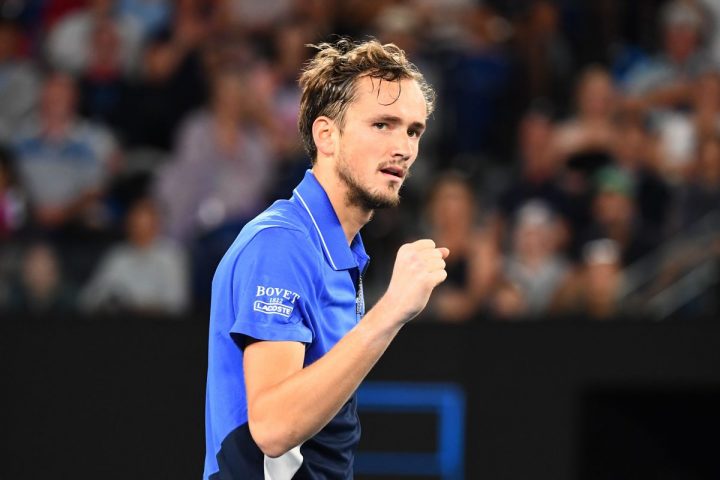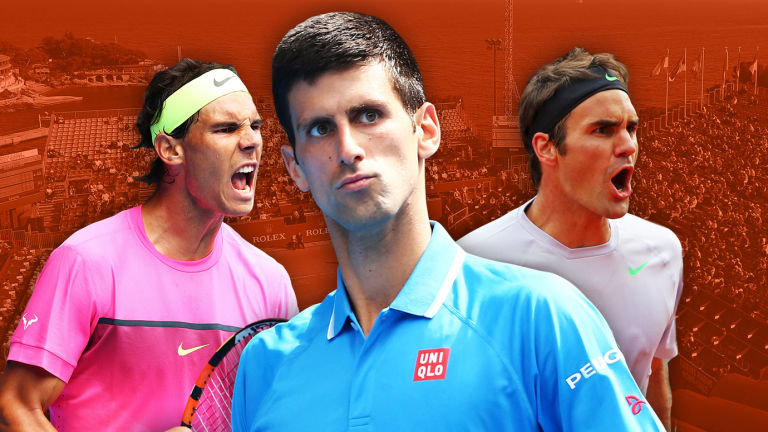Written by Federico Bertelli
The second and final instalment of our interview with Fabrice Sbarro, who was part of Daniil Medvedev’s team as data analyst, during his successful summer season of 2019. After telling UbiTennis how Sbarro managed to convince coach Cervara (Medvedev’s coach), we broaden the field of analysis to the whole world of tennis. How important is that famous ‘1%’ difference, which at most becomes 2%? Considering such a slim margin can mark the difference between multiple Grand Slam winners and the rest field, maybe it’s something worth investigating…
CHAPTER 3 – SMALL TALKS AND FUTURE PERSPECTIVES
We were talking about that 1% of extra-success; considering the level of competition in man’s tennis, that makes sometimes winning or losing a match a little more than a toin coss, everything that can give an edge is surely interesting. The conversation continued on this topic.
Q: Maybe it is still not that clear the difference it makes that 1%. What do you think Fabrice?
A: 1% is not a tiny difference. Djokovic, Nadal and Federer in their careers scored a percentage of points won around 54%. Maybe people think that these great champions, because of their successes, have simply wiped out their opponents. But the reality is different and even for them the margins are narrow, they won around 54% of points played in their career. I’ll tell you more: Gasquet in his career won around 52% of the points. On one hand, the Big Three has won dozens of Slam titles, while the Frenchman has only reached the semi-finals in a Major. In short, my idea is to help athletes to reach that 1%, to provide a competitive advantage that can allow them to step up a gear and reach new heights. Daniil was at the same level as Gasquet at the beginning of 2019, standing at 52% of points won. During the period from Montreal to Shanghai, in which we collaborated, this figure jumped to 54% (on the levels of the big 3).
Q: Can you tell us how your collaboration with Gilles and Daniil developed?
A: In the period from Montreal to Shanghai 2019, I helped Gilles in the preparation of the matches and we were completely on the same page, sharing thoughts at all level. And it was incredible, because usually the coaches hardly trust 100% and tend to discard most of the proposals. But with Cervara it was different, he was really believing in what we were doing. He liked the concept. And I could check it first hand, because in that period Daniil actually translated our indications on the field at a rate of 70-80%; obviously there is also the opponent on the field and obviously a lot of factors are involved in a success story, also luck. For example, at the Us Open Daniil was clearly injured and was lucky to get away with it. But after Shanghai another very important aspect emerged: psychology.
Q: What does it mean?
A: After Shanghai, a tournament in which Medvedev had beaten Zverev in the final, Daniil’s status had changed, he had now become a superstar, no longer just a good player, but one who rivalled the best and could compete at a Slam level. And arguably, from an emotional point of view it was not easy to manage. After all, Daniil was coming from an exhaustive ride, both mentally and physically. Maybe, the fact of having ascended to a completely different status was also carrying more pressure: maybe this kind of pressure plus all the physical and mental toll was an excessive burden to manage. After Shanghai he felt the need to play in a certain sense alone, without the aid of statistics, despite the fact that coach Cervara was fully supportive of the new approach. Basically, Daniil wanted to test himself and do his own thing. Despite this turnaround, the relationship of trust with Gilles was not harmed, he continued to pay me in order to have my analysis: my work after Shanghai had a different perspective, aimed at developing the game of Daniil in a broader sense and not just focus on tactical pre match advice. In other words, even if we no longer did the statistical preparation of the matches and therefore no longer took care of the tactical aspects, we worked in terms of post-match analysis, in order to understand what was working and what not. It does not mean that Daniil’s refusal to rely on the statistical approach is definitive, simply for now we are exploring other ways, even if it is arguably a shame.

Let’s consider the rematch with Wawrinka at the Australian Open. I had studied the game of Wawrinka and I realized that although for most of 2019 the backhand of Stan was going wild, in the last few weeks before the happy Slam, things had changed: already in Doha, I noticed that the shot had returned solid. I knew that Vallverdu (Stan’s coach) had focused on that shot; so even if the backhand is a shot that Daniil plays very well, me and Gilles had suggested that going to much crosscourt on the backhand would not be a good idea; instead, would have been better to go down the line earlier in the rally. Unfortunately, it did not go that way. Since numbers don’t lie, at the end of the match I reviewed the match and noticed that Daniil had played 85% of his backhand crosscourt. Obviously, we will never know what could have happened with a different tactic. But certainly, it was a hard-fought game that could have gone either way. And when the matches are so contested small details make the difference.
From an outside perspective, it seemed that after Shanghai Medvedev had lost the magic that had led him to sniff victory against Nadal, in one of the most dramatic Grand Slam victories of the Spaniard. And quickly Daniil was going back to the level he had at the beginning of 2019. Once again tennis proved to be a sport in which climbing to the top is a process made of steps that costs time and effort; progress that can be reverted very quickly. In such a competitive world, where statistics are not yet handled by most of the players and coaches themselves, mastering data can give an even more significant competitive advantage. And speaking of tennis players who have made a great leap forward, one cannot avoid talking about Matteo Berrettini, named “Most improved player” in 2019.
Q: Talking about Matteo Berrettini, what are your thoughts Fabrice?
A: I think that all the players who worked with data experts got results and Berrettini is a good example: he started 2019 around number 50 and managed to close the season in the top 8 and go to the Finals. And he worked with Craig O’Shannessy. With all due respect it was not expected to end at number 8! Being a top ten means more or less winning 52% of the points, a performance that was not the standard for Berrettini. Berrettini: top 30 / top 50, won about 51% of the points. Once again: we are talking about a difference of one percentage in terms of point won, but precisely, this is the difference between a good player and the absolute elite. I am absolutely convinced that Craig O’Shannessy was crucial in Berrettini’s quantum leap. In the end, it’s about small details, like serving strategies, being a little more aggressive and looking a little bit more for the net, or using the slice a little more. In the end, this is what we are talking about and this is the role of a statistics expert who interprets the data in order to suggest tactical adjustments. In short, data is coming!
Q: Do you think many players are already benefiting from these small adjustments?
A: Definitely, and a good example is surely Murray: I know for sure he has benefited from this type of support. Andy was certainly a top player but probably not at the level of the other three, and the fact that he managed to say a word in that contest is amazing. Maybe what I say is completely wrong, but in my opinion, he was an excellent top ten, like Berdych for example, who really was only one step away from being a Grand Slam champion, also reaching the final in Wimbledon. Murray instead won Slams, the Olympics and had a completely different career. While the other three were sitting above 54% of points won, Murray remained slightly above 53%, but still better than 52% which is the top ten mark.
Q: A part from Medvedev, did you have other important collaborations in 2019?
A: Yes, I collaborated with Nicolas Mahut, who told me that he was interested in my job and wanted to have a try. And the occasion when we started to get serious was the 2019 London Masters. During that tournament we made preparations for each match. It was a great effort because I had never dealt before with doubles and so I built a database of matches in order to chart the style of all the competing couples of Mahut and Herbert at the ATP doubles finals in London. But in the end, they didn’t lose a single set in the whole event and considering the quality of the opponents it was a great result. Of course, this is not to say that statistics was the reason of the success. But maybe, it was not only a matter of Herbert and Mahut being unbeatable in their good days, as some sceptics say. Anyway, building from that result, I decided to start following even the double, but only the best 20 couples in the world in order to provide my services only to the best in class.



 Hot Topics3 days ago
Hot Topics3 days ago
 Latest news3 days ago
Latest news3 days ago
 Hot Topics2 days ago
Hot Topics2 days ago
 Hot Topics3 days ago
Hot Topics3 days ago
 Focus2 days ago
Focus2 days ago
 Focus2 days ago
Focus2 days ago
 Focus2 days ago
Focus2 days ago
 Hot Topics2 days ago
Hot Topics2 days ago




























